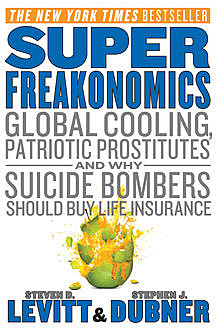SuperFreakonomics
- hasac39534membuat kutipan4 tahun yang laluThe authorities who oversaw the monkey lab feared that introducing money to the capuchins would irreparably damage their social structure.
They were probably right.
If the capuchins were so quick to turn to prostitution as soon as they got hold of some money, just imagine how quickly the world would be overrun with monkey murderers and monkey terrorists, with monkey polluters who contribute to global warming and monkey doctors who fail to wash their hands. Future generations of monkeys, of course, would come along and
solve these problems. But there would always be something to fix—like the monkeys’ pigheaded insistence that all their children ride in car seats - hasac39534membuat kutipan4 tahun yang laluWhat Chen had seen wasn’t altruism at all, but rather the first instance of monkey prostitution in the recorded history of science
- hasac39534membuat kutipan4 tahun yang laluChen saw something remarkable. One monkey, rather than handing his coin over to the humans for a grape or a slice of apple, instead approached a second monkey and gave it to her. Chen had done earlier research in which monkeys were found to be altruistic. Had he just witnessed an unprompted act of monkey altruism?
After a few seconds of grooming— bam! —the two capuchins were having sex - hasac39534membuat kutipan4 tahun yang lalubut on this day, for reasons Chen could never understand, Felix did not gather up the twelve coins on the tray and use them to buy food. Instead, he flung the entire tray’s worth of coins back into the communal cage and, fleeing the testing chamber, dashed in after them—a bank heist followed by a jailbreak.
There was chaos in the big cage, with twelve coins on the floor and seven monkeys going after them. When Chen and the other researchers went inside to get the coins, the monkeys wouldn’t give them up. After all, they had learned that the coins had value. So the humans resorted to bribing the capuchins with treats. This taught the monkeys another valuable lesson: crime pays - hasac39534membuat kutipan4 tahun yang laluThe fact is that similar experiments with human beings—day traders, for instance—had found that people make the same kind of irrational decisions at a nearly identical rate. The data generated by the capuchin monkeys, Chen says, “make them statistically indistinguishable from most stock-market investors
- hasac39534membuat kutipan4 tahun yang laluA rational monkey wouldn’t have cared, but these irrational monkeys suffered from what psychologists call “loss aversion.” They behaved as if the pain from losing a grape was greater than the pleasure from gaining one.
- hasac39534membuat kutipan4 tahun yang laluIn both cases, the monkey got the same number of grapes on average. But the first gamble was framed as a potential gain while the second was framed as a potential loss.
How did the capuchins react?
Given that the monkeys aren’t very smart in the first place, you might assume that any gambling strategy was well beyond their capabilities. In that case, you’d expect them to prefer it when a researcher initially offered them two grapes instead of one. But precisely the opposite happened! Once the monkeys figured out that the two-grape researcher sometimes withheld the second grape and that the one-grape researcher sometimes added a bonus grape, the monkeys strongly preferred the one-grape researcher. - hasac39534membuat kutipan4 tahun yang laluNow that he had witnessed their rational behavior, Chen wanted to test the capuchins for irrational behavior. He set up two gambling games. In the first, a capuchin was shown one grape and, dependent on a coin flip, either got only that grape or won a bonus grape as well. In the second game, the capuchin started out seeing two grapes, but if the coin flip went against him, the researchers took away one grape and the monkey got only one
- hasac39534membuat kutipan4 tahun yang laluThe most basic law of economics—that the demand curve slopes downward—held for monkeys as well as humans
- hasac39534membuat kutipan4 tahun yang laluChen now introduced price shocks and income shocks to the monkeys’
economy. Let’s say Felix’s favorite food was Jell-O, and he was accustomed to getting three cubes of it for one coin. How would he respond if one coin suddenly bought just two cubes?
To Chen’s surprise, Felix and the others responded rationally. When the price of a given food rose, the monkeys bought less of it, and when the price fell, they bought more.
fb2epub
Seret dan letakkan file Anda
(maksimal 5 sekaligus)


